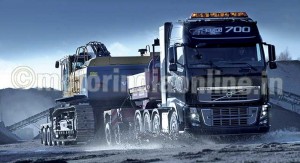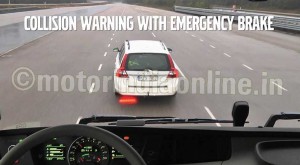Volvo Trucks is one of the very few truly global commercial vehicle companies present in all major markets and with customers in more than 120 countries. The advantage of being global for us as a manufacturer is economies of scale as also input and demands from customers and society all over the world. The advantage for customers and the societies where we are present is that they can benefit from the most advanced innovations driving progress in terms of transport efficiency as also improvements to safety and for the environment.
Founded by two human-centric entrepreneurs, Volvo has always been powered by the innovative spirit. There are several examples of how this has transformed the transport society. In 1959, we turned the first attempts to strap in vehicle drivers into the ingenious three-point-safety belt. No other innovation has saved more lives in traffic. It has created huge value for society, both from a human and economical point of view. In 1976, Volvo did the same for the environment by introducing the catalytic converter with electronic Lambda probe. We have been pioneering emission control technology ever since, also for diesel engines.
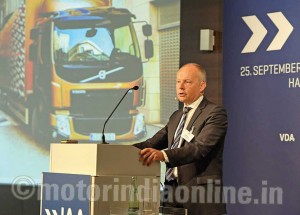
These are two excellent examples of Volvo’s soul. We thrive on creating innovations that are “Driving Progress”, for the people that buy and drive our trucks and for the society we all share.
Several of the global challenges we face are directly or indirectly related to the infrastructure and the transport sector, such as climate change, population growth and rapid urbanisation. The world needs sustainable transport solutions, and our vision is to be the world leader.
Traditionally, sustainability in the transport industry has primarily focused on reducing environmental impact. This is still a vital area, but today we have a broader scope. First of all, to really make a difference in a globalized society you have to be a truly global company.
The lack of uniform legislations and standards is a well-known challenge for a truck manufacturer. But being global mitigates the problem in different ways.
The fragmented standardisation turned into an R&D advantage when we used experiences from solving the US10 requirements for creating efficient Euro 6 solutions. But again, it would have been even better for everyone, us as manufacturer, customers and society if the US, the EU and Japanese rules had been harmonized.
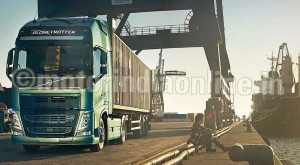 Being present all over the world also gives us a more credible position when discussing the urge for more uniform legislations and standards with regional policymakers. Another aspect is that global customers find it beneficial to partner with a global truck manufacturer. They want solutions that are available on all markets they operate in.
Being present all over the world also gives us a more credible position when discussing the urge for more uniform legislations and standards with regional policymakers. Another aspect is that global customers find it beneficial to partner with a global truck manufacturer. They want solutions that are available on all markets they operate in.
Our partnership with the global logistics company DP DHL is an excellent example of a win-win co-operation. A better understanding of the customer’s needs makes it possible for us to focus on the right things in our development work. The mutual understanding is especially important when approaching new, groundbreaking areas such as autonomous drive and alternative fuels.
Ensuring the customer’s confidence in the advantages and reliability of a new technology is a core part of this type of partnership.
Let’s move on to the proof points.
How does the innovation power of Volvo Trucks contribute to more sustainable transport solutions at the same time as they improve the customer’s transport efficiency?
I will give you examples within three major areas:
Connectivity – information and communication technology – has potential for a positive impact on mobility in several fields, such as emissions, safety, traffic flow and infrastructure. Platooning, in other words creating a road train by connecting a number of vehicles electronically, relies strongly on connectivity involving drivers, vehicles, infrastructure and traffic management.
Volvo Trucks has been part of successful field tests of platooning, for instance within the Sartre project. And the technology development is continuing. However, a new legislative framework is needed to enable an introduction of autonomous vehicles on a larger scale.
Connectivity can also be used to improve truck uptime. Our latest truck generation uses telematics to monitor the vehicle and its key components. It enables the workshop to follow actual component wear and condition online. This makes it possible to truly optimize preventive maintenance and avoid unplanned stops that interrupt mobility. Connected services is yet another great innovation that makes Volvo trucks go further and better, and at the end of the day it helps to create better profitability for our customers.
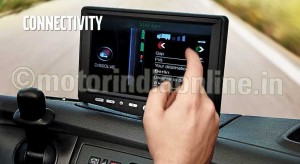 Alternative drivelines is another vital focus area. In 2011 we were first to launch a heavy-duty truck powered by Methane Diesel technology. Methane is a fuel we believe strongly in. Using liquefied gas in the diesel process, our Methane Diesel trucks enable longer and heavier transports – a unique quality for a gas truck. The technology results in considerably lower fuel consumption compared with traditional gas vehicles.
Alternative drivelines is another vital focus area. In 2011 we were first to launch a heavy-duty truck powered by Methane Diesel technology. Methane is a fuel we believe strongly in. Using liquefied gas in the diesel process, our Methane Diesel trucks enable longer and heavier transports – a unique quality for a gas truck. The technology results in considerably lower fuel consumption compared with traditional gas vehicles.
Since a widespread availability of a new fuel is even more important in long-haul operation, the success of the methane diesel depends on the dedication of fuel producers and distributors. A wider use of liquefied natural gas will also help boost the demand for liquefied biogas produced from renewable sources. We are also exploring other solutions, such as electric hybrids and trucks powered by Dimethyl Ether, DME. However, once again, a large-scale introduction requires clear political directions.
Road safety is another important part of the quest for sustainable mobility. With about 1.2 million people killed every year, traffic accidents are one of the world’s major “health” problems. Creating a better interaction between the driver, truck and the surrounding traffic is at the heart of Volvo Trucks’ safety approach.  And with our aim to be the leader in safety within our industry, there is only one acceptable number of injuries and deaths in traffic, and that is zero!
And with our aim to be the leader in safety within our industry, there is only one acceptable number of injuries and deaths in traffic, and that is zero!
Innovative technology is required to reach this vision. However, it also takes an extended interplay between the vehicles, the surrounding traffic and the infrastructure, as well as an uncompromising attitude within the whole society.
Collision Warning with Emergency Brake is one of our latest safety innovations The system, which deals with both stationary and moving vehicles, is able to prevent a collision with a moving target at relative speeds of up to 70 km/h. Facilitating the driver’s work is a matter of efficiency, safety and health, our groundbreaking Volvo Dynamic Steering is a fantastic improvement in this field. You can steer a heavily loaded truck without any effort. Even at low speeds on a rough surface.
The stable, effortless steering helps the driver to stay focused and alert. It will also relive a lot of truck drivers of aching necks, arms and backs. And, as 73 million YouTube viewers around the globe have noticed, the precision steering also enabled “The Epic Split” by Jean Claude van Damme.
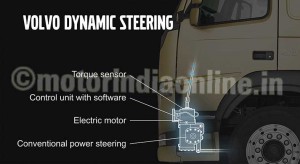 To conclude:
To conclude:
Investing in development of useful, innovative technologies is money well spent for us. Driving customer efficiency and profitability certainly reinforces our competitiveness. However, to be able to make a game-changing contribution to a sustainable transport society we also need consistent and long-term policies.
For an innovation-driven company, global harmonization is very important. New paradigm shift concepts are very costly to introduce. Society must give a clear signal that it is prepared to engage in introducing and implementing them. Here we need political leadership that reaches beyond borders. Determined policymakers and innovative companies are the keys to a sustainable future. As always, Volvo Trucks is determined to play a major role in this positive development.
